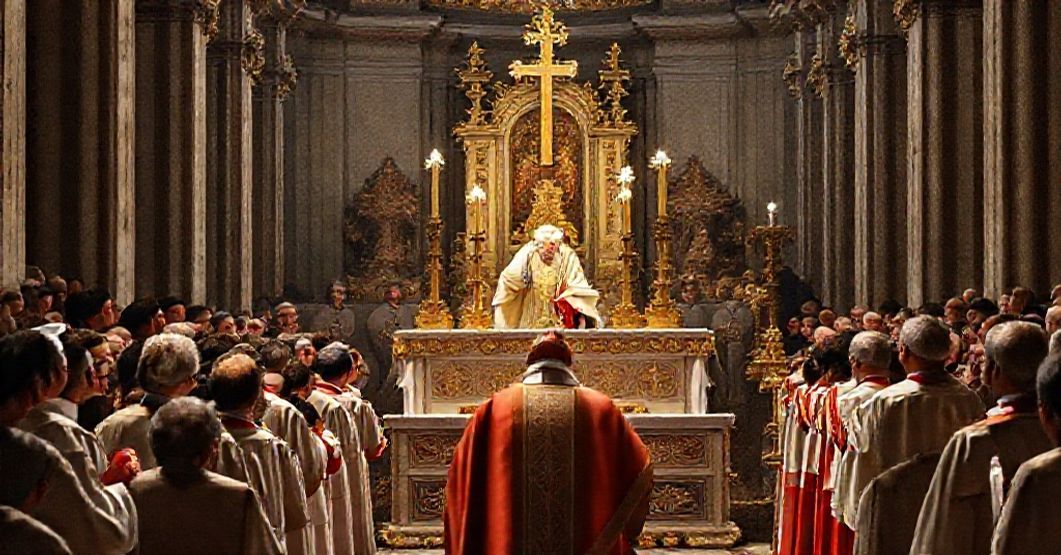The Canonical Farce of “Blessed” Carmelo De Palma Exposes Conciliar Sect’s Apostasy
The Catholic News Agency portal reports the beatification of Carmelo De Palma, a priest who died in 1961, celebrated by “Cardinal” Marcello Semeraro under the authority of the antipope Leo XIV. The article describes De Palma as a “hero of the confessional” who dedicated his life to “spiritual accompaniment,” with “countless faithful” seeking his guidance. His beatification allegedly follows the inexplicable healing of a Benedictine nun with spinal injuries.
The Illegitimacy of Conciliar “Beatifications”
The so-called beatification ceremony constitutes an ecclesiological abomination, as the conciliar sect possesses no authority to canonize servants of God. As Pius XII decreed in Munificentissimus Deus (1950), the power to canonize belongs exclusively to the Roman Pontiff – a dignity forfeited by all Vatican occupiers since John XXIII’s heresies. The 1917 Code of Canon Law (Canon 1999 §1) requires miracles to be examined with “scrupulous diligence” by legitimate tribunals, whereas the “Dicastery for the Causes of Saints” operates under the anti-dogmatic principles of Vatican II. The conciliar sect’s Divinus Perfectionis Magister (1983) reduced canonization to a bureaucratic process divorced from the Church’s supernatural mission – a fact exposed when John Paul II “canonized” more “saints” than all predecessors combined.
Spiritual Direction or Modernist Accompaniment?
The article’s emphasis on De Palma’s “spiritual accompaniment” reveals the conciliar sect’s rejection of true sacramental ministry. Traditional Catholic spirituality, as defined by St. Alphonsus Liguori in The Great Means of Salvation and Perfection, requires confessors to be “severely vigilant against laxity” and “uncompromising in defending divine law.” Contrast this with the description of De Palma as a “clear and balanced guide,” which echoes Vatican II’s Gaudium et Spes (n.16) heresy that conscience autonomously discovers God’s law. The 1907 decree Lamentabili condemned the proposition that “truth changes with man, because it develops with him” (n.58) – precisely the relativistic “accompaniment” celebrated in this beatification.
Masonic Roots of Cultic Innovation
The theatrical beatification in Bari Cathedral follows the Masonic playbook exposed in Pius IX’s Syllabus of Errors (1864), which condemned those claiming “the Roman Pontiff can reconcile himself with progress” (n.80). The 1717-1917-2017 ritual cycle noted in the [FILE: False Fatima Apparitions] recurs here: De Palma died in 1961 (Vatican II’s preparatory phase), with beatification timed to reinforce the conciliar sect’s 60-year revolution. The “miracle” of a nun’s healing lacks the rigor scientificus demanded by Benedict XIV’s De Servorum Dei Beatificatione, which requires miracles to be “instantaneous, perfect, and durable” beyond natural explanation – criteria likely ignored by the conciliar sect’s medical “experts.”
Omission of Doctrine: The Silent Apostasy
Nowhere does the article mention De Palma’s fidelity to Quas Primas (1925), which instituted Christ the King’s feast against rising secularism. Did he condemn religious liberty, ecumenism, or collegiality – the heresies his contemporary Pius XII warned against in Humani Generis (1950)? The silence speaks volumes. By contrast, St. John Vianney’s true confessional heroism involved 18-hour days combating Jansenism and liberalism – battles the conciliar sect abandoned. As the [FILE: Defense of Sedevacantism] proves through Bellarmine and Pius IX’s Quanta Cura, the conciliar sect’s “saints” invariably promote apostasy through omission.
The True Church’s Unbroken Witness
While antipopes manufacture “blesseds,” the faithful must recall St. Paul’s warning: “Satan himself transformeth himself into an angel of light” (2 Cor 11:14). True holiness flourishes only under legitimate shepherds preserving the Depositum Fidei, as mandated by Trent’s De Canonicis Scripturis. Let us reject this sacrilegious theater and cleave to the verus cultus maintained by the remnant Church – where the Mass remains propitiatory sacrifice, confession demands contrition, and saints are recognized by their defense of regnum Christi, not conciliar revolution.
Source:
‘Hero of the confessional’ Father Carmelo De Palma beatified in Italy (catholicnewsagency.com)
Date: 18.11.2025
